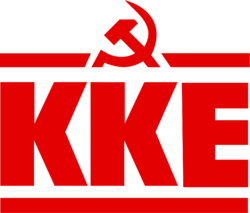Still working to recover. Please don't edit quite yet.
Communist Party of Greece
The Communist Party of Greece (Greek: KKE, Kommunistiko Komma Elladas) was formed on November 17, 1918 in Greece due to the upsurge in the revolutionary movement in the country, which was strengthened by the effect of the Great October Socialist Revolution in Russia. Until 1920 it was called the Socialist Labor Party of Greece; at the second congress, which approved the party's relationship to the Comintern, it was called the Socialist Labor Party of Greece (Communist). In 1924, at the third extraordinary congress of the party, it was renamed the Communist Party of Greece. From 1929-1931 KKE had a leadership factional fight - the party made it through this crisis within the inner party, which the Comintern became involved in (address of the Executive Committee of the Comintern, November 1931). The sixth plenum of the Central Committee of the KKE (January 1934), in consultation with the Comintern, planned strategy and tactics of the party, defining the future revolution in Greece as bourgeois democratic with the likelihood of it rapidly growing into a socialist one. With the establishment in Greece of the openly fascist dictatorship of General Ioannis Metaxas (August 1936), KKE was outlawed.
During World War II (1939-1945), KKE took the initiative of creating the National Liberation Front (EAM) in September 1941, and the People's Liberation Army (ELAS) in December 1941. In March 1944, EAM created the Political and Security committee of national liberation. The basis of the people's democratic authority was laid by the heroic fight of Greek people in the country (numbering 435,000 in October 1944) led by KKE; however this process was interrupted by the armed intervention of England in December 1944. The anti-democratic forces, whose authority was backed by the British military, established a regime of terror, pushing the country towards civil war. In October 1946 the Democratic Army of Greece (Dimokratikos Stratos Elladas, DSE), carried on a struggle against the domestic reaction, against the interference of English and American imperialism in Greece, and for national independence, democracy and social progress. In December 1947 KKE was outlawed, forty thousand communists were jailed, and tens of thousands emigrated from the country.
After the end of the Civil War (September 1949), the center of gravity of the work of the party is transferred to the organization of the economic and political struggles of all layers of the working class. The party took a more left-wing party line. The sixth extended plenum of the Central Committee and Central Control Commission (March 1956) had the party review and change the party line, and elect new KKE leadership. The Bureau of the Central Committee, the temporary governing body until February 1957, was created at this time as well. The eighth congress of the KKE (1961) summarized the experience of the revolutionary movement in Greece over the previous twenty years, and adopted a new program which oriented Greek communists to fight for the realization in the country of national-democratic changes as a necessary stage of the passage to the socialist reconstruction of Greece. After the establishment of a military dictatorship on April 21, 1967, KKE joined together with all anti-dictatorial forces into a united front for the overthrow of the dictatorial regime and the revival of democracy and social progress in the country.
In 1968, a KKE faction left the party and called itself the Communist Party of Greece (interior). The KKE organized resistance among workers and students to the junta, which was weakened by demonstrations at the Polytechnic School of Athens in November 1973. The dictatorship fell in 1974.
In 1989 the KKE joined an alliance of political parties called the Coalition of the Left and Progress (Synaspismos). KKE withdrew from Synaspismos in June 1991, although some people decided to leave KKE and remain in Synaspismos.
The congresses of the Communist Party of Greece:[edit]
- The 1st congress - November 1918, Piraeus
- The 2nd congress - April 1920, Athens
- Extraordinary pre-election congress - September 1920, Athens
- Extraordinary congress - October 1922, Athens
- Extraordinary pre-election congress - September 1923, Athens
- The 3rd (extraordinary) congress - From November 26 to December 3, 1924, Athens
- The 3rd (ordinary) congress - March 1927, Athens
- The 4th congress - December 1928, Athens
- The 5th congress - March 1934, Athens
- The 6th congress - December 1935, Athens
- The 7th congress - October 1945, Athens
- The 8th congress - August 1961 (illegally)
- The 9th congress - December 1973 (illegally)
- The 10th congress - May 1978
- The 11th congress - December 1982, Athens
- The 12th congress - May 1987
- The 13th congress - February 19-24, 1991, Athens
- The 14th congress - December 18-21, 1991, Athens
- The 15th congress - May 22-26, 1996, Athens
International conferences[edit]
KKE delegations participated in international conferences of Communist and working parties (1957, 1960, 1969, Moscow). KKE approved the documents accepted at the conferences.


